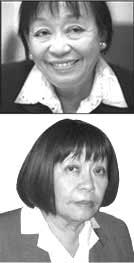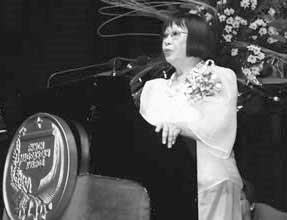KASAMA Vol. 19 No.
3 / July-August-September 2005 / Solidarity Philippines Australia
Network
Telling the truth and getting away with
it

September 21, 2005
HAYDEE YORAC
will be given a hero’s burial tomorrow at the
Libingan ng mga Bayani. A resolution unanimously
approved by the Senate yesterday paved the way for Yorac’s
interment at the cemetery otherwise reserved for military personnel and
government dignitaries. For years, the family of the disgraced
former president Ferdinand Marcos has asked the government to allow his
burial there. Up to now, 15 years after Marcos’ death,
permission has not been given and the former president continues to lie
in state in a mausoleum in Ilocos Norte.
In recognizing Yorac’s achievement as a public servant, the
Senate resolution cited “her feisty conviction, high
principles, and building confidence in government through service of
exceptional integrity and rigor.” For these, the Senate said,
Yorac deserved the honor of being buried in the heroes’
cemetery.
Yorac died in Chicago on September 13, after a lingering bout with
cancer. Her burial will take place after a memorial service at the UP
Chapel at 7:30 a.m. tomorrow.
The following is a tribute I delivered at a memorial service held for
her last night:
Haydee Yorac told it like it is. This is about as rare in public life
as a polar bear in Boracay. If it were more common, our country
wouldn’t be in the fix it is in today. There would be no need
for apologies, no crises triggered by “lapses in
judgment.”
Haydee dazzled because she told the unvarnished truth.
”Truth, like light, blinds,” one of her favorite
writers, the existentialist Albert Camus wrote.
“Falsehood,” said Camus, “is a beautiful
twilight that enhances every object.”
If there is anything that Haydee’s life has shown us, it is
this: You can tell the truth and get away with it. You can tell the
truth and still be so loved, so respected and so feared. Haydee knew,
much more than anyone in public life today, the awesome power of truth,
of honesty and of personal integrity.
Unfortunately, truth telling is uncommon these days, not just in
politics but also in the profession to which I belong. I have been in
journalism for over 20 years and I can tell you that the media often
give more space to the “beautiful twilight” of
falsehood, flattery and prevarication than to the glaring light of
truth.
This is why we needed Haydee. She showed us glimpses of that light. She
had a bullshit detector better than anyone of us had. I know this from
personal experience because some years ago, I was asked to introduce
her as the keynote speaker at a media conference. I, of course, went
overboard. It is not difficult to be hyperbolic about Haydee.

She wasn’t pleased. She told me half–jokingly that
she thought I was beyond sycophancy. Ok, maybe I was sucking up to her.
After all, I am a big Haydee fan. Her law firm was also giving us free
legal advice. And let’s admit it, we all have an inner Joe de
Venecia in all of us. I thought I had restrained mine better than most.
But Haydee was too sharp to let it pass. She knew that words come
easily to us, smooth talk even easier.
The moral of the story is: You can’t get one over Haydee. You
don’t even try. Ask her former law students. Ask Danding
Cojuangco. Ask Imee Marcos and Ali Dimaporo. Ask RAM and the MNLF and
the NDF. They will tell you that Haydee had uncommon wisdom and
uncommon sense. She had a razor–sharp intellect. She had a
mind that was so clear because it was uncluttered by ambition or by
lust for wealth or power. It was a mind that was free because it was
not shackled to a personal, political or ideological agenda.
Journalists don’t see such clarity very often. She told EVEN
US the painful truth. At that media conference, she quoted
Camus, who was both a novelist and a journalist. The French writer
famously said: “A free press can be good or bad, but, most
certainly without freedom, the press will never be anything but
bad.”
Without missing a beat, and flashing that famous glare, Haydee then
proceeded to tell the journalists present there that thus far, in the
Philippines, Camus’ promise, that a free press can be good
remained largely in the realm of existential possibility rather than
reality.
This is why Haydee will be so sorely missed. Everyone sucks up to the
media in this country, but not her. And yet, even if she
didn’t wine or dine journalists or schmooze with editors or
columnists, she had an enviably good press. Every journalist I know had
real, not just grudging, respect for her. We were all in awe of her. It
makes me wonder: if we had more public officials like Haydee Yorac, men
and women who appeal to our nobler, rather than baser, instincts, would
we also not have a better press? Or for that matter, a better society?
In the last few days, Haydee’s many achievements have been
recalled. I will not repeat them. We remember also her warmth, her
humanity, her deep and abiding faith. We miss the glee with which she
lapped up jokes. She had a keen sense of the absurd and the ridiculous.
She was sensitive to the power of humor: not only is it a weapon of the
weak against the strong, it also helps keep us sane despite the madness
of the times.
Through those times, Haydee had an unerring sense of what is important.
Her career as a lawyer and as a public official focused on the
most elemental things that make a democracy work: clean elections,
justice, accountability.
As head of the National Unification Commission, she went around the
country to probe the roots of conflict. She saw that it was not
ideology, but the hunger and thirst for justice that drove rebellion.
As a human rights lawyer during the Marcos era, Haydee had already
realized that people did not need law, they needed justice. Peace, she
said, could be obtained only through a social contract for a just,
humane and equitable society. “The peaceful resolutions of
armed conflict,” she said then, meant “neither
blame nor surrender, but dignity for all.”
Truth. Justice. Dignity for all. These are big words. We avoid them now
because these are complicated times and these words have been much
abused. Besides, we are being told that there are other things that are
more important: terrorism, the economy, political stability. With the
budget deficit and rising oil prices, these are not times for waxing
philosophical or existential.
Tonight, I will dare to speak big words in memory of Haydee Yorac. Her
greatness lay in believing in the possibility of truth, justice and
human dignity. Even in the most faithless times, Haydee believed. She
believed that the greatness of the human spirit lies in the struggle
against the forces that overwhelm it. As her favorite, Camus, said:
“It isn’t happiness we should seek, but much more
than that, a kind of
greatness–in–despair.”
Haydee had that kind of greatness that stood out in times of despair.
We sorely need it now. But now that she is gone, we have to find that
greatness in our own selves. “In the depth of
winter,” Camus wrote, “I finally learned that there
was in me an invincible summer.”
This is a winter as deep, as harsh as any. The best tribute we can pay
to the great Filipina we are honoring tonight is to find the invincible
Haydee within all of us.
This article from
Inside PCIJ: Stories Behind Our Stories
http://www.pcij.org/blog/?p=405
is reprinted with permission from the
author, Sheila Coronel, Executive Director of the Philippine Centre for
Investigative Journalism.
The photos are from:
http://www.akbayan.org/
 Home | Aims and Objectives of Solidarity Philippines Australia Network | About Kasama
Home | Aims and Objectives of Solidarity Philippines Australia Network | About Kasama 